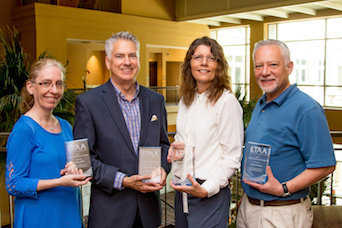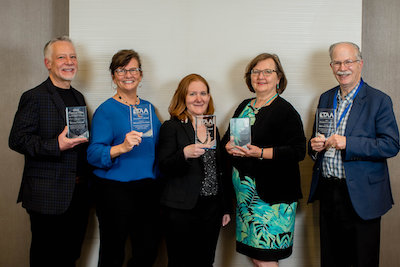TAA Previous Council Award Winners and Council of Fellows Inductees
TAA Previous Council Award winners and Council of Fellows Inductees

TAA Council of Fellows Inductees
(by year of induction)
1999
Everett E. Dennis
Mike Keedy
Lee Mountain
Karl J. Smith
Michael Sullivan
2000
William R. Pasewark, Sr.
Thomas L. Wheelen
2001
D. Stanley Eitzen
Karen M. Hess
J. David Hunger

2002
Charles D. Holland
2003
Patrick G. McKeown
2005
Marilyn Fordney
Karen C. Timberlake
2009
Robert Christopherson
Fred S. Kleiner
2010
Molefi Kete Asante
2012
Karen Morris
2013
Patrice Morin-Spatz
Belverd E. Needles, Jr.
June Jamrich Parsons
Michael D. Spiegler
2017
Kathleen King
2019
Kevin Patton
Janet Salmons
2020
Steven Barkan
2024
Laura Frost
2025
Charles Corbin
Previous Council Award Winners
(by year and Award name)
1993
Mike Keedy (Mike Keedy Award)
1994
Ron Pynn (Mike Keedy Award)
William R. Pasewark, Sr. (President’s Award)
1995
John Vivian (Mike Keedy Award)
William R. Pasewark, Sr. (President’s Award)
1996
Michael Lennie (Mike Keedy Award)
Jean Sullivan (Norma Hood Award)
1997
Michael Sullivan (Mike Keedy Award)
Mary Kay Switzer (Norma Hood Award)
John Vivian (President’s Award)
1998
William R. Pasewark, Sr. (Mike Keedy Award)
Jay Black (Norma Hood Award)
1999
Franklin Silverman (Mike Keedy Award)
Paul Tippens (Norma Hood Award)
Peggy Stanfield (President’s Award)
2000
Kim Pawlak (Mike Keedy Award)
Chris Harris (Norma Hood Award)
Ron Pynn (President’s Award)
2001
Gerald Stone (Mike Keedy Award)
Donna Besser (Norma Hood Award)
Paul Siegel (President’s Award)
2002
Tara Gray (Norma Hood Award)
Michael Lennie (President’s Award)
2003
Jay Black (Mike Keedy Award)
Franklin Silverman (Franklin Silverman Lifetime Achievement Award)
Kim Pawlak (Norma Hood Award)
John Wakefield (President’s Award)
2005
Stephen Gillen (Mike Keedy Award)
Paul Anderson (Franklin Silverman Lifetime Achievement Award)
Janet Tucker (Norma Hood Award)
Robert W. Christopherson (President’s Award)
2006
Ron Pynn (Franklin Silverman Lifetime Achievement Award)
Lydia T. Seidick (Norma Hood Award)
Michael Sullivan (President’s Award)
2007
Christopher Harris (Mike Keedy Award)
Michael Sullivan (Franklin Silverman Lifetime Achievement Award)
Kim Pawlak (Norma Hood Award)
Michael Lennie (President’s Award)
Tara Gray (Paul Anderson Award)
2008
Molefi Kete Asante (Mike Keedy Award)
Kenneth Henson (Franklin Silverman Lifetime Achievement Award)
Margaret Matson (Norma Hood Award)
Paul Siegel (President’s Award)
Kim Pawlak (Paul Anderson Award)
2009
Stephen Gillen (President’s Award)
2010
Barbara Waxer (President’s Award)
2011
Barbara Waxer (Mike Keedy Award)
Fred Kleiner (Franklin Silverman Lifetime Achievement Award)
Paula Heimbecker (Norma Hood Award)
Tara Gray (President’s Award)
2012
Michael Sullivan (Mike Keedy Award)
Gerald Stone (Franklin Silverman Lifetime Achievement Award)
Fred S. Kleiner (Norma Hood Award)
D. Stanley Eitzen (President’s Award)
Steven E. Barkan (President’s Award)
Kim Pawlak (Paul Anderson Award)
Ron Pynn (Ron Pynn Award)
Joy Hakim (Ron Pynn Award)
2013
Stephen Gillen (Mike Keedy Award)
Robert Christopherson (Franklin Silverman Lifetime Achievement Award)
Patrice Morin-Spatz (Norma Hood Award)
Michael Spiegler (President’s Award)
Maureen Foerster (Paul Anderson Award)
Fred S.Kleiner (Ron Pynn Award)
2014
Richard Hull (Mike Keedy Award)
Maureen Foerster (Norma Hood Award)
Mary Kay Switzer (Paul Anderson Award)
2015
Christopher Kenneally (Mike Keedy Award)
William R. Pasewark, Sr. (Franklin Silverman Lifetime Achievement Award)
Mike Kennamer (Norma Hood Award)
Steven E. Barkan (President’s Award)
Dannelle Stevens (Paul Anderson Award)
Michael D. Spiegler (Ron Pynn Award)
2016
Claudia Sanchez (Mike Keedy Award)
Sean Wakely (Mike Keedy Award)
Kevin Patton (Norma Hood Award)
Laura Frost (President’s Award)
Pat Goodson (Paul Anderson Award)
2017
Lorraine Papazian-Boyce (Mike Keedy Award)
June Jamrich Parsons (Franklin Silverman Lifetime Achievement Award)
Stephen Gillen (Norma Hood Award)
Karen Morris (President’s Award)
Michael Spinella (President’s Award)
Felicia Moore-Mensah (Paul Anderson Award)
2018
Janet Salmons (Mike Keedy Award)
Stephen Gillen (Franklin Silverman Lifetime Achievement Award)
Bekky Murphy (Norma Hood Award)
Kim Pawlak (President’s Award)
2019
Juli Saitz (Mike Keedy Award)
Richard Hull (Norma Hood Award)
Steven E. Barkan (President’s Award)
Maureen Foerster (President’s Award)
Claudia Sanchez (Paul Anderson Award)
2020
Robert Christopherson (Keedy-Anderson Award)
Steven Barkan (Pynn-Silverman Lifetime Achievement Award)
June Parsons (President’s Award)
2021
Eric Schmieder (Keedy-Anderson Award)
Richard Hull (Author Mentoring Award)
Committee for Diversity, Equity, and Inclusion (President's Award)
Stacie Craft DeFreitas (Rising Star Award)
2024
Brenda Ulrich (President's Award)
Kevin Patton (Author Mentoring Award)
Daphne Watkins (Pynn-Silverman Lifetime Achievement Award)
2025
Christine Harrington (TAA Authoring Mentoring Award)
Steven Barkan (TAA Social Justice Award)
The following awards were retired in 2025
Rising Star Award
Rising Star was intended to recognize authors earlier in their careers whose published work(s) to date have had impact in their discipline and indicate a likelihood of significant future contributions.
The Rising Star Award was based on recognition of a particular work of excellence—it may even be the first work produced by the candidate—however, the selection committee was looking for indications that the candidate is poised to make ongoing contributions to the discipline. Also under consideration was whether the work(s) represent a significant finding; an innovative research methodology; a major contribution to diversity, equity or inclusion efforts; or a particularly impactful work for peers or students.
Although the award was primarily bestowed for authoring of scholarly or educational works, candidates had to demonstrate achievements/contributions in one or more of the following areas:
- Scholarship/writing which may include research, textbook authoring, academic publication, presentations, or other scholarly and creative activities, but need not include a long list of publications. It is understood that this award in intended for early-career authors, so a first publication may even be submitted.
- Professional service which may include service to TAA, or work at the community, state, or national levels that represents or promotes academic and educational publishing.
Pynn-Silverman Lifetime Achievement Award
The Pynn-Silverman Award recognized authors whose writing, teaching, and service over a full career have demonstrated the highest degree of excellence in authoring and commitment to the community.
Publication History
Successful candidates authored a considerable body of work in their field that has proven over time to reflect the best understanding of their discipline at the time, and to have helped advance knowledge of the discipline. Works that also address issues of diversity, equity, and inclusion and/or have been instrumental in resisting oppression and discrimination are encouraged.
While co-authored works were eligible for consideration, it was expected that the candidate authored a number of works alone. There was no set number of works required to qualify, but a successful candidate authored a substantial number of article-length works and/or several book-length works.
Textbooks, courseware, monographs, and journal articles were all considered, but the essential element was high-quality and proven value over time. Other considerations that may indicate a strong candidate might be having published in more than one discipline or specialty area, and evidence of recognition of the quality of the author’s works as shown by winning TAA Textbook awards, or other national awards for teaching or writing.
Professional Public Standing
Successful candidates provided evidence of their standing as prominent contributors to their discipline. This might be shown through awards or citations for teaching, recognition as a regular speaker, especially keynotes, at national conferences in the awardee’s discipline, or other indicators as appropriate.
Successful candidates were able to show their work contributed to increased public understanding and appreciation of their field and/or of academic standards. For example, a candidate may provide newspaper and magazine articles, or television appearances representing them as recognized experts who can translate issues in their discipline to the public.
|